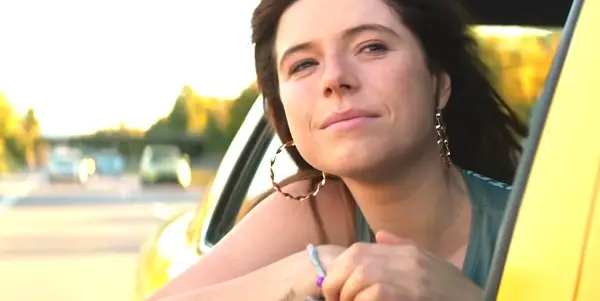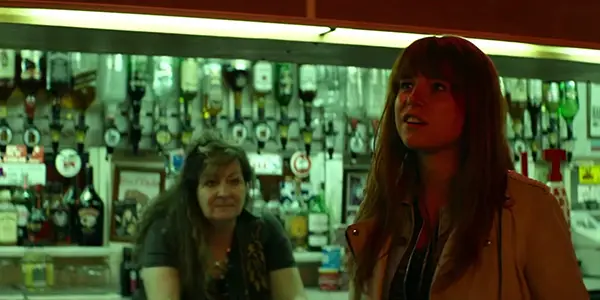WILD ROSE: A Magnificent Lead Performance In An Underwhelming Underdog Story

Alistair is a 25 year old writer based in Cambridge.…
It’s hard to believe that Jessie Buckley was once rejected by two separate drama schools. A trained vocalist who performed in numerous stage musicals in her native Ireland, encouragement to apply for prestigious acting schools in Britain led to short-lived disappointment – the day after she received one rejection letter, she auditioned for Andrew Lloyd Webber’s BBC talent competition I’d Do Anything (to find a new Nancy for his production of Oliver!), which she eventually finished in second place.
She’s spent a decade proving the power of her vocals on the stage, and using her TV capital to study at the prestigious Royal Academy of Dramatic Art. She’s spent years mastering her craft, and in only her second film role, you’d never guess she was still a newcomer with only a handful of credits to her name. Don’t be surprised if she wins an Oscar within the next five years.
A Showcase for Jessie Buckley
If there is any reason to watch Wild Rose, it’s Buckley’s lead performance. It plays to her two established strengths; the power of her vocal performances, and the unexpected intensity she brought to her previous lead role in Michael Pearce’s psychological thriller Beast. In Buckley’s hands, country singer Rose-Lynn Harlan feels like she exists outside of the frame; the film contorts into familiar narrative directions, but she doesn’t compromise her portrayal of the character in the same way. She manages to convey her reckless energy without being burdened by the confines of the predictable underdog story she’s been forced into. It’s a fantastic showcase for her versatile acting talent – and this is all in spite of the formulaic would-be crowd pleaser around her.
If critics and audiences are being bowled over by Wild Rose, it’s safe to assume that it’s entirely due to the towering performance at the film’s centre. Remove this from the equation, and there’s very little in director Tom Harper’s film of interest – it’s the same working class underdog story the British film industry was producing en masse following the unexpected international success of The Full Monty more than 20 years ago. As a gritty character drama it could work, but this follows the most banal feel good movie template, forcing character conflicts and plot contrivances in order to land a euphoric climax that doesn’t feel earned. There may be a Wild Rose in the lead, but all around her, the grit has been sanitised within an inch of its life.

As stated above, Buckley stars as Rose-Lynn Harlan, an aspiring country singer who dreams of going to Nashville. After being released from prison for drug smuggling, she aims to resume her gig at the Glaswegian country club where she’s performed since she was a teenager – even if it means neglecting her two children, and lapsing back in to her reckless behaviour that landed her behind bars in the first place. After the electronic tag around her ankle stops her performing after 7pm, she gets a job as a cleaner for the middle class Susannah (Sophie Okonedo), who discovers her passion for country singing. In the most groan-inducing deus ex machina imaginable, Susannah just so happens to have a contact at the BBC who can get Rose-Lynn in touch with country DJ Bob Harris.
The latter plot contortion, an unlikely trip to the BBC headquarters in London to meet Britain’s foremost country music specialist, is where the film lost all pretences towards realism. Plenty of films have married a downtrodden social realist aspect with something more fanciful, without sacrificing this down to earth nature – the victories in a movie like The Full Monty feel earned because they’re small scale, and are innately attached to very human stakes. Wild Rose is happy to lose all credulity as it sees fit, rushing to get a step further to a triumphant finale even if it means sacrificing the working class grit that makes the underdog story so appealing in the first place. There’s no thrill in seeing Rose-Lynn overcome adversity if the answers to all her problems are conveniently handed to her by secondary characters.
Built on lazy contrivances
When the film does try to stay true to its roots and add human stakes, it conveniently forgets about them at every available opportunity. Rose-Lynn’s neglectful behaviour as a mother is often sidelined to earnestly follow her dream of being a country star – previously resentful characters (like her mother, played by Julie Walters) eventually side with her and look after her children to aid her career, even though nothing in the screenplay makes their sudden changes of heart palatable. Nicole Taylor’s screenplay also tries to usher in conflict from the sidelines, as Susannah’s husband tells Rose-Lynn in no uncertain terms that he thinks she’s a scam artist trying to get money from his wife to help her career. This should have ramifications in the narrative, but it’s quite literally never mentioned again, not offering even the most minor complication within this formulaic rags-to-riches story.

But the real insult to injury in Harper’s film is the handling of the expected feel-good climax (naturally, I’ll avoid spoilers, even though this is an entry into a canon of films sold entirely on the fact audiences will walk away smiling despite the gritty drama that came before it). After chronicling Rose-Lynn’s struggle for country music success, the movie instead chooses the unsatisfying route of ending her story before she even makes a big splash – cutting ahead to a year in the future where she’s made it, offering the triumphant ending without any context as to how she got there.
It’s an incredibly lazy way to close the film; a refusal to do the bare minimum in terms of storytelling, yet still fully expecting audiences to regard the ending as well earned. I may be spellbound by Buckley’s performance and her singing talent (even if her natural singing voice doesn’t make for a perfect fit with the thick Scottish accent she’s putting on), but that doesn’t mean I can’t see through this cheap, lazy trick.
Wild Rose: Conclusion
Jessie Buckley is a star, and the fact she makes Wild Rose almost worth watching is testament to her skill as an actress. But the film is a regurgitation of bland underdog story tropes, too contrived and too devoid of tangible dramatic conflict to have the effect that it needs.
What are your thoughts on Wild Rose?
Wild Rose is released in the UK on April 12, and in the US on June 14. All international release dates are here.
Does content like this matter to you?
Become a Member and support film journalism. Unlock access to all of Film Inquiry`s great articles. Join a community of like-minded readers who are passionate about cinema - get access to our private members Network, give back to independent filmmakers, and more.
Alistair is a 25 year old writer based in Cambridge. He has been writing about film since the start of 2014, and in addition to Film Inquiry, regularly contributes to Gay Essential and The Digital Fix, with additional bylines in Film Stories, the BFI and Vague Visages. Because of his work for Film Inquiry, he is a recognised member of GALECA, the Gay & Lesbian Entertainment Critics' Association.













